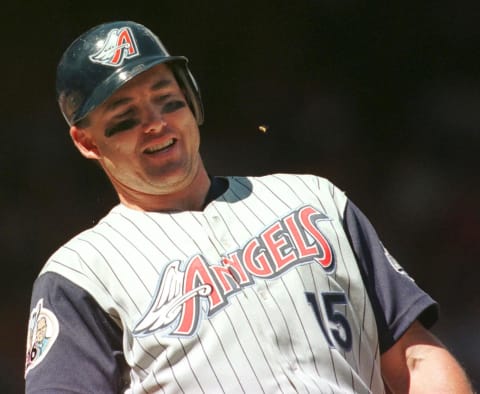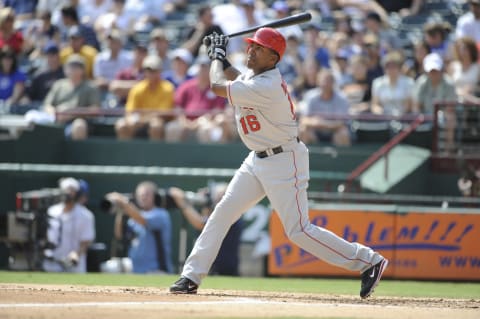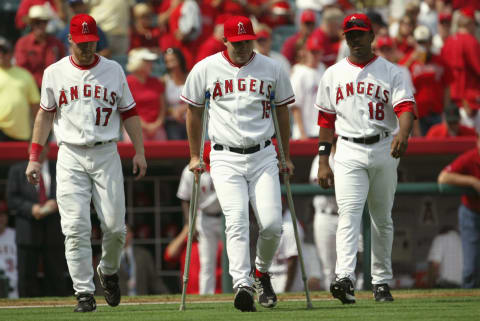LA Angels player battles: Tim Salmon vs Garret Anderson

The careers of Tim Salmon and Garret Anderson intertwine deeply within the history of the Los Angeles Angels, but in a battle between the two, there is only one clear winner.
Earlier this week, I ran a poll on the Halo Hangout Facebook page asking a simple question of lifelong Angels fans; who would you take if you could have either Tim Salmon or Garret Anderson back in their primes? The poll garnered quite a response, with 295 people voting as of this writing, which should have been expected when pitting two of the greatest Angels of the last 30 years against one another.
Amazingly enough though, of the 295 votes, the results were fairly evenly split. 154 thought that Salmon should be the clear winner, and 141 preferred the return of Anderson. Some cited reasons for their vote, including whether one or the other was over or underrated, the consistency of the two, or even what side of the plate they hit from. Clearly, Angels fans were torn between the two.
However, since the vote was so clearly split, I thought it would be worthwhile to examine the two and their various pluses and minuses to see which come out on top.
For the sake of argument, I thought it was best to stick to the offensive side of the game. Neither was considered a solid fielder. According to FanGraphs, Salmon was a lifetime -139.9 DEF and only never had a single season where he rated positively in the category. Meanwhile, Anderson was a -59.6 over his career, and only saw six seasons where he graded on the plus side of the scale. It would be tough to make a case for either player taking defense into account and if we’re being honest, neither is really remembered for their contributions on that side of the ball.
The good news is that offensively, we can get a fairly even picture on both. Salmon played all 14 years of his career in an Angels uniform. On the other side of the coin, Anderson played 17 years in the Majors, but his last two came in Braves and Dodgers uniforms respectfully. To keep things even, we’ll not consider the latter two seasons in our comparison.
So let’s get started, shall we?

Tim Salmon vs Garret Anderson: Salmon was the more productive hitter
Tim Salmon made his debut for the Angels in 1992 and was on a quick, and saw limited time during his initial call-up. However, he was on an upward trajectory starting in 1993 when he won the American League Rookie of the Year award on the back of a season where he hit .283/.382/.536 with 31 home runs and drove in 95. He would finish the season with a strong 4.7 fWAR and a wRC+ of 143.
The momentum continued for Salmon over the next several years. He would place seventh in the AL MVP voting in 1995 and won his only Silver Slugger award that season by putting up career bests in home runs (34), wRC+ (163), and fWAR (5.8). It could be said that Salmon should have finished as high as third or fourth in the voting, a year when Mo Vaughn inexplicably won the award despite significant fWAR differences between him and those that finished behind him (Albert Belle, Edgar Martinez, and Randy Johnson).
Salmon would continue to shine throughout the rest of his Angels tenure, hitting a cumulative .282/.385/.498 for his career, totaling 299 home runs and 1016 RBI. From an advanced metrics standpoint, Salmon owned a career wRC+ of 130, well above the league average of 100, a wOBA of .383, and an fWAR of 35.4.
Alternatively, Garret Anderson ran a very similar path. After a short cup of coffee in 1994, Anderson burst onto the scene in 1995, hitting .321/.352/.505 with 16 home runs and 69 RBI. That was good for a wRC+ of 117 and an fWAR of 2.7. It earned him a second-place nod in the AL Rookie of the Year voting, despite playing 30 fewer games than Marty Cordova of the Twins.
Anderson’s best season came during the World Series campaign in 2002. While Anderson’s best MVP finish would be fourth during the World Series run in 2002 (Miguel Tejada was the winner), his 2003 season was actually his best year. World Series hangover did not impact Anderson, as he put up a career-bests in fWAR (5.1) and wRC+ (129) while hitting.
Overall, Anderson would put up a batting line of .296/.327/.469 with 272 home runs and 1292 RBI as a member of the Angels. Anderson also had an average wRC+ of 102.5 and a lifetime fWAR of 26.4 with Los Angeles. Anderson also gets plus points for leading the team all-time in hits, RBI, runs, and more (for now, thanks to one familiar guy names Mike Trout).
Advantage: Salmon

Tim Salmon vs Garret Anderson: Salmon was the more consistent player
During our poll, one of the prevailing arguments was that Anderson was the more consistent player and was drastically underrated. While the latter may be true, the former is not.
From 1993 to 2003, Tim Salmon put up 11-consecutive seasons with a wRC+ of 104 or higher, consistently placing himself above replacement player level. Dialing deeper into that timespan, Salmon only twice went below 120 in wRC+, putting up marks of 117 in 1999 and 104 in 2001 respectfully.
Likewise, Salmon proved that being an on-base machine (as commenter Ryan Krol pointed out on the poll) had a value that would be greatly appreciated in today’s game. His weighted on-base percentage (wOBA) would dip below .350 only three times in his career, during his 23-game cup of coffee in 1992 (.258), his 2001 campaign (.335), and during his injury-shortened season of 2004 (.281).
All of this weighed heavily in his fWAR totals, where Salmon had a lifetime total of 35.4. Over his 14 years, Salmon was rated at 3.0 fWAR or higher in six seasons and only five times dipped below two wins above replacement. Only twice was Salmon rated below replacement value, again during the 1992 and 2004 campaigns.
Alternatively, Garret Anderson struggled a bit with consistency during his time with the Angels. After putting up a 117 wRC+ in his rookie season, Anderson was below league average for five consecutive seasons from 1996 to 2000. He would grade positively in the category five out of the next eight seasons in Anaheim.
Oddly enough, Anderson’s toughest years with the bat ran almost hand in hand with his best years in the field. He graded positively in DEF four of the five seasons from 1996 to 2000, and they ultimately helped to tent-pole up his fWAR during those lean years with the bat. From 1995 through his final year with the Halos, Anderson above replacement value in all but one season (2005. However, he also fell below two wins above replacement in half of his fourteen seasons with the Angels.
And if we are comparing apples to oranges, wOBA doesn’t do Anderson any favors either. While Salmon rarely fell below the .350 mark in weighted on-base percentage, Anderson only crested the mark twice and had a career mark of .334. Respectful, but not Salmon-like.
Advantage: Salmon

Tim Salmon vs Garret Anderson: Salmon was the more consistent player
So while Garret Anderson may hold many club records (records that are bound to be surpassed by Mike Trout sooner than later), Tim Salmon epitomizes what the Angels were about during that mid-90s through early 2000s.
His injuries in 2004 likely cost him three years of production that would have put no doubts into this debate. As it is, Salmon ranks 52nd all-time among right-fielders in terms of JAWS, a measurement that computes a player’s overall production against their best seven-year stretch to determine their Hall of Fame eligibility. Salmon’s score of 36.1 puts him far below the average cut-off of 57.2, but it also puts him among some very solid players from past and present generations.
Likewise, Garret Anderson was a solid player in his own right, and maybe he is a bit underrated in the grand scheme of things. His 24.2 JAWS score however paints a picture of a player whose consistency doesn’t rank on par with the all-time great left-fielders (average cutoff of 53.6) and has him in the same realm as another Angels’ great in Don Baylor.
LA Angels: 5 Questions the team must answer when play resumes
For what it is worth, it is hard imagining the Angels of that period as good as they were without either player, and they both played integral roles in the team’s only World Series championship in 2002. For that, Angels fans wouldn’t trade either for the world and it wouldn’t be hard to see that the only applicable answer here should be, “I’ll take both.”